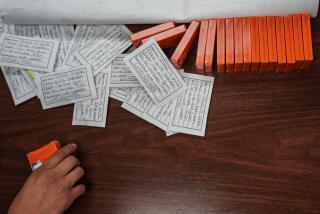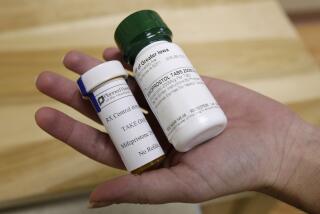Justices to consider shield for drug, cigarette firms
WASHINGTON — The Supreme Court signaled Friday that it may be ready to shield drug companies and cigarette makers from lawsuits from consumers who say they were not fully warned of the dangers of the product.
The justices voted to hear a pair of appeals from industry lawyers that, if upheld, would erect a new barrier to lawsuits.
For many years, lawyers for the pharmaceutical industry and cigarette makers have argued that their products should be shielded from suits if they have been approved for use by a federal agency -- such as the Food and Drug Administration -- and a warning label is included.
For example, most prescription drugs come with labels that indicate they may be safely used under certain conditions. Consumers are also warned against overdosing or using the drug for other purposes.
Industry lawyers say these federally approved warning labels should “preempt” or block lawsuits in state courts from consumers who say they used the drug as prescribed but were badly hurt by it. They say the FDA, and not jurors, should have the role of deciding when drugs can be used safely.
“Prescription drug labeling is precisely the type of complex and technical regulatory regime that warrants deference to the expertise of the agency,” attorneys for drug maker Wyeth said in an appeal the court agreed to hear.
Congress has refused to erect such a shield in the law. The high court could do so, however, in the cases to be heard later this year.
In one case, the justices agreed to hear Wyeth’s appeal of a $6.8-million verdict in favor of a Vermont musician whose arm had to be amputated after she was injected with Phenergan, a nausea medication.
Diane Levine, the musician, sued Wyeth, and a Vermont jury agreed that the drug maker should have warned nurses and doctors against injecting the drug. In April 2000, she went to a health clinic complaining of a migraine and nausea. The injection she was given punctured an artery in her arm, which led to gangrene.
But Wyeth said the suit should be thrown out because the FDA had approved the use of injections to administer its anti-nausea drugs and because the label warned against injecting the drug into an artery.
Wyeth attorneys said “tens of thousands” of drug cases in the courts turn on this issue.
In the second case, the court agreed to hear an appeal from cigarette maker Philip Morris USA, which faces at least 30 suits across the country from smokers who say they were deceived into thinking that “light” cigarettes were less dangerous.
Philip Morris attorneys say all these claims should be thrown out because the federally approved labels warned consumers of the dangers of smoking.
In the past, the high court has split on this issue and has allowed some lawsuits against the cigarette industry for deceiving smokers about the danger of tobacco.
Georgetown law professor David Vladeck said the two cases could portend “an enormous change in the common law,” particularly for legal claims involving prescription drugs.
If the FDA’s approval is enough to shield a drug maker from being sued, “this could give drug makers an immunity from litigation they have long coveted,” he said. “It also sends exactly the wrong message to drug companies. We know the names of drugs like Vioxx and Rezulin because of the failures of FDA regulation.”
In the last year, the high court has handed down a series of rulings that have limited lawsuits against corporations.
On Tuesday, the court sharply limited suits for stock fraud by shielding bankers, accountants and outside vendors, even if they knowingly participated in a scheme to inflate a company’s earnings. The justices said the suits should be restricted to the company that fooled its stockholders, not those who schemed with them.
The two new cases focus on the conflict between federal regulation of an industry and state laws that protect consumers. Typically, injured persons sue a product maker in their states’ courts. Often, the product maker points to the federal regulation of its product and argues this government approval should act as a shield.
The two new cases renew this long-running dispute over when federal regulation preempts suits in a state court.
In December, the court heard arguments in a third such case. It tests when makers of medical devices are shielded from being sued. In that pending case, Riegel vs. Medtronic Inc., a woman is suing because her husband was badly hurt and later died when a balloon catheter ruptured after it was inserted in his heart artery.
--
More to Read
Sign up for Essential California
The most important California stories and recommendations in your inbox every morning.
You may occasionally receive promotional content from the Los Angeles Times.











